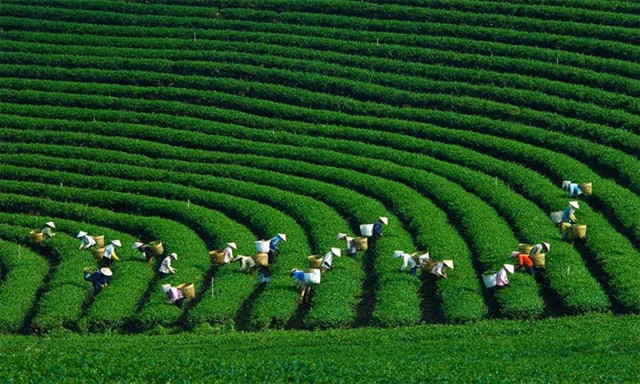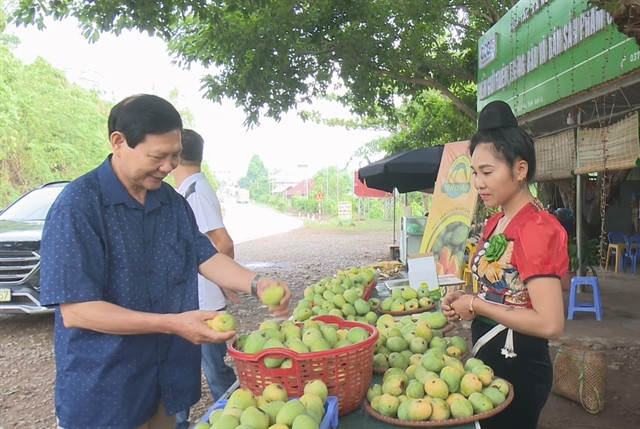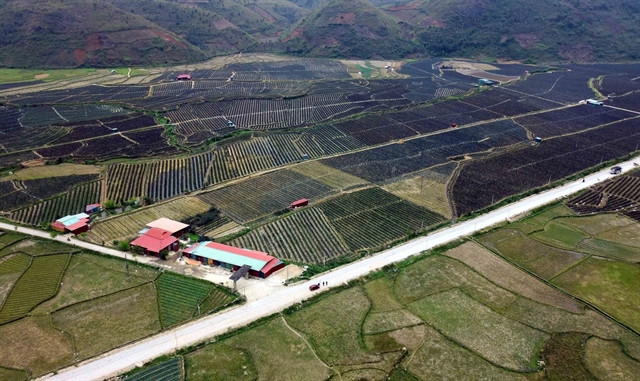 |
| Tea hills in Mộc Châu District are one of the tourist magnets in Sơn La Province. Photo dulichmocchau.org |
The northwestern mountain province of Sơn La has been effectively utilising agricultural products as means to promote tourism, harvesting promising results in recent years.
The province has launched a number of tourism products to integrate speciality farm produce with farmstay resorts, native cultural experiences, and community-based tourism.
The highlight is festivals associated with the promotion of distinctive local products, such as the Fruit Harvest Festival, the Highland Tea Festival, the Lychee Festival, the Mango Festival, and the Coffee Festival.
Festival goers are taken on a visit to the orchards and tea hills during which they can pick fresh fruits or tea and enjoy them on the spot. After that, they can enjoy various art performances and folk games with the local people.
The One Commune, One Priority Product, or OCOP, programme, initiated by the Ministry of Agriculture and Rural Development in 2008, is meant to promote the special farm products or handicrafts with unique qualities that can help develop the economy in the countryside, and implement the national target programme on new-style rural area building.
 |
| FEELING FRUITY: A tourist buys mangoes, an OCOP item of Sơn La. VNS Photo |
After nearly five years of implementing the programme, Sơn La currently has 83 OCOP products, including 51 certified with three stars, 31 with four stars, and one with the national-level five-star certification.
Coffee holds a prominent position among the leading OCOP products and serves as a key export commodity in the region, while also being closely associated with tourism activities.
According to Nguyễn Xuân Thao, the director of the Bích Thao Coffee Cooperative, whose pure ground coffee has been granted a five-star OCOP certificate for high qualities and special characteristics. The coffee beans must be fully ripe, and harvested and processed according to specific procedures.
Besides, Sơn La has supported two four-star tourism products, namely the Ngọc Chiến Community Tourism Site in Ngọc Chiến Commune, Mường La District, and the Pha Đin Tourist Site in Phổng Lái Commune, Thuận Châu District.
Speciality glutinous rice
Ngọc Chiến Commune has been renowned for a type of speciality glutinous rice cultivated by generations of the Thái ethnic community. This rice variety possesses several valuable features - a white and translucent grain, a shiny appearance, a chewy texture, and rich flavour. It has become a recognised commodity providing stable income for local farmers.
The locality currently has an area of 250 hectares of glutinous rice, yielding from 4 to 4.5 tonnes per hectare. Every year, local residents organise a festival to celebrate the new rice harvest to honour their traditional culture, customs and beliefs.
Up to now, Ngọc Chiến's fragrant sticky rice not only meets the four-star OCOP standard, but the rice fields and the rice festival here have also become tourist attractions.
According to the Department of Agriculture and Rural Development in Sơn La, promoting sustainable tourism based on the green growth, agricultural specialties and cultural resources of each locality is one of the key tasks of the National Target Programme for building new rural areas.
Therefore, the OCOP and agritourism development programmes in the construction of new rural areas for the 2021-25 period have been identified as key solutions and tasks to promote rural economic development.
Nguyễn Thành Công, vice chairman of the People's Committee of Sơn La Province, said there were nearly 30 locations in the province engaged in agritourism activities.
Hoàng Ngân Hoàn, director of the Provincial Department of Culture, Sports and Tourism, added that the implementation of the new-style rural programme had brought about a facelift, particularly in terms of infrastructure, creating a favourable environment for the development of agritourism.
"In its turn, community tourism has become a driving force in promoting the new rural construction. The development of community tourism brings about better changes in economic restructuring, creating typical products while preserving the original cultural values of the ethnic communities in Sơn La," he said.
Rural tourism
To develop agritourism products, Sơn La has developed a plan regarding rural tourism development in building rural areas with a new lifestyle for the period 2023-25.
The plan is expected to promote the province's tourism in its strategic development direction, based on utilising the strengths of local agricultural products and creating unique, distinctive and attractive tourism products.
It will also help increase income and improve the living standards of local communities, contribute to the restoration and development of traditional cultural values and local products.
 |
| BIRD'S-EYE VIEW: The landscape of Ngọc Chiến District, a tourist attraction in Sơn La Province. VNA/VNS Photo Quang Quyết |
The province aims to develop and standardise rural tourism destinations and products by 2025. Localities with advantages in tourism development strive to have at least one rural tourism destination associated with local agriculture, culture, traditional crafts or ecological environment.
It also sets the targets of developing at least one distinctive tourism product and ensuring that over half of rural tourism businesses meet the standards of serving tourists.
Other targets include promoting the development of rural tourism in conjunction with digital transformation, having at least 50 per cent of rural tourism destinations digitally connected on promotional platforms and introducing all local rural tourism destinations.
Localities with tourism potential in the province are expected to build at least one model of agritourism linkage. At least 70 per cent of tourism business owners will be trained in management and 80 per cent of the tourism workforce will be equipped with enhanced skills and customer service abilities.
At the same time, a database and digital map of rural tourism destinations within Sơn La will be introduced by 2025. VNS